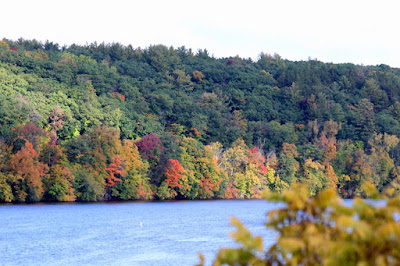 |
| is the St. Croix River watershed a bioregion?
Photo by J. Harrington
|
I'm continuing to work at getting an understanding of Minnesota's bioregions. I'm not referring strictly to the ecoregions of Minnesota, although they are elements of the identification of a bioregion. Peter Berg and Raymond Dasmond have crafted art least the four following definitions of "bioregion":
- Definitions of “Bioregion”
“A bioregion is defined in terms of the unique overall pattern of natural characteristics that are found in a specific place. The main features are generally found throughout a continuous geographic terrain and include a particular climate, local aspects of seasons, landforms, watersheds, soils, and native plants and animals.” (Peter Berg)
“A bioregion can be determined initially by use of climatology, physiography, animal and plant geography, natural history and other descriptive natural sciences. The final boundaries of a bioregion, however, are best described by the people who have lived within it, through human recognition of the realities of living-in-place.” (Peter Berg & Raymond Dasmann)
“People are also counted as an integral aspect of a place’s life, as can be seen in the ecologically adaptive cultures of early inhabitants, and in the activities of present day reinhabitants who attempt to harmonize in a sustainable way with the place where they live.” (Peter Berg)
“A bioregion refers both to geographical terrain and a terrain of consciousness -- to a place and the ideas that have developed about how to live in that place.” (Peter Berg and Raymond Dasmann)
 |
| a black bear statue in the Minnesota Goose Garden
Photo by J. Harrington
|
Part of what refocused my attention onto bioregions is the recognition that several of the species in the Appalachia Field Guide are also found in Minnesota, the smallmouth bass and the lake sturgeon among fishes and the black bear among mammals. I'll work toward a more complete comparison during the upcoming week. I'm more convinced than ever that we humans need to redevelop a closer and better identification with the places we "live, work and play" as the saying goes. Globalism has become unbalanced and will continue doing the same to us until we reach a (tipping) point at which our initial identity is as a citizen of Earth and a member of her community. We have a way to go yet.
The Poem that Took the Place of a Mountain
There it was, word for word,The poem that took the place of a mountain.He breathed its oxygen,Even when the book lay turned in the dust of his table.It reminded him how he had neededA place to go to in his own direction,How he had recomposed the pines,Shifted the rocks and picked his way among clouds,For the outlook that would be right,Where he would be complete in an unexplained completion:The exact rock where his inexactnessesWould discover, at last, the view toward which they had edged,Where he could lie and, gazing down at the sea,Recognize his unique and solitary home.
********************************************
Thanks for visiting. Come again when you can.
Please be kind to each other while you can.
No comments:
Post a Comment